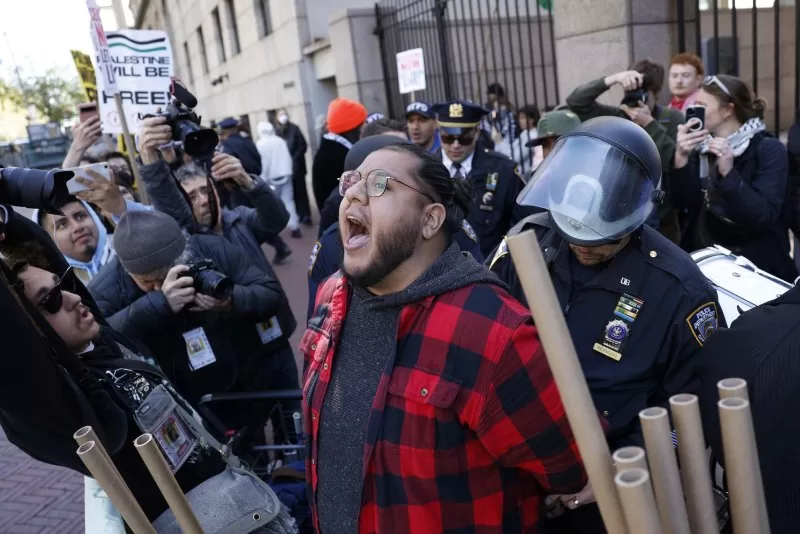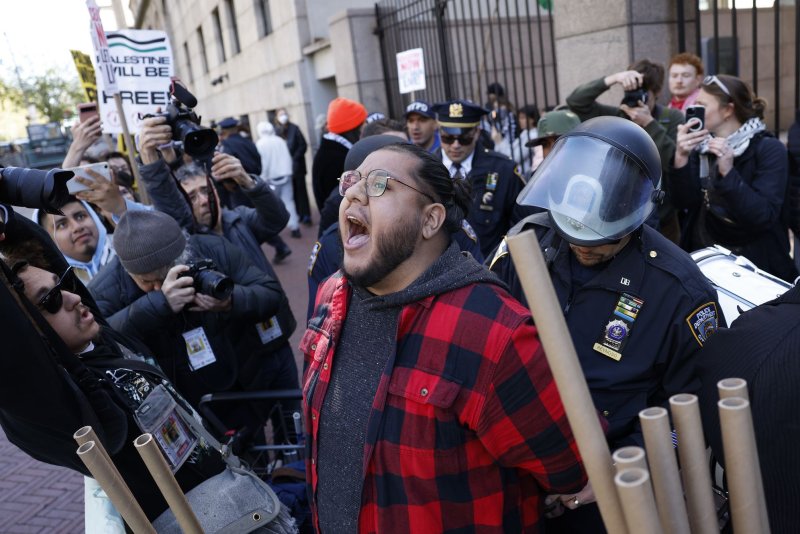1 of 9 | A pro-Palestinian protester is arrested at Columbia University in New York on Monday. Columbia University announced that classes would be held remotely starting Monday, as pro-Palestinian protests continued for the sixth day on the school’s campus. Photo by John Angelillo/UPI |
License PhotoApril 22 (UPI) — All classes at Columbia University were held virtually on Monday, the same day a bipartisan congressional group called for the university president’s ouster from the Ivy League school amid tension over Israel’s war against Hamas in Gaza.
“As the leader of this institution, one of your chief objectives, morally and under law, is to ensure students have a safe learning environment,” read a letter singed by all 10 Republican members of New York’s congressional delegation to University President Minouche Shafik.
“By every measure, you have failed this obligation,” it read.
On Thursday, New York City police arrested more than 108 protesters who had camped out on Columbia campus, including Isra Hirsi, the daughter of U.S. Rep. Ilhan Omar, D-Minn., for more than 30 hours. Police officials said the protesters received summonses for trespass. Columbia said all students who participated have been suspended.
By Monday, Shafik had announced the shift to virtual classes in a letter to members of the Columbia community just hours before classes were to begin after more than 100 pro-Palestinian protesters who had occupied the school’s south law were arrested last week. She said the move online was to “de-escalate the rancor and give us all a chance to consider next steps.”
“The decibel of our disagreements has only increased in recent days. These tensions have been exploited and amplified by individuals who are not affiliated with Columbia who have come to campus to pursue their own agendas,” she said, adding how the university needs “a reset.”
The 10 New York Republican’s called for Shafik to “turn the page on this shameful chapter” by giving a “prompt” resignation, claiming the unfolding situation “is a direct symptom of your continued lax enforcement of policy and clear double standards.”
Shafik’s “failure to enforce the rules on campus has created an environment in which students and outside agitators know they are able to operate with impunity and without any accountability,” the letter stated.
A reporter for The Intercept who is familiar with the ongoing situation took to social media Monday afternoon to say how it is “very telling that on the same day politicians are swooping in to Columbia’s campus to demonize student protestors,” Prem Thakker posted on X, “hundreds of teachers are putting themselves out there to stand alongside those same students.”
The day before on Sunday, Sen. John Fetterman, a Pennsylvania Democrat and staunch pro-Israel ally to the chagrin of many of his fellow Democrats, also called for Shafik to resign. He called the ongoing tensions “antisemitic, unconscionable, and dangerous.”
“Add some tiki torches and it’s Charlottesville for these Jewish students,” Fetterman posted on X.
The Hill had reported that while there have been no reports of actual violence, a “significant portion” of the protesting students were Jewish. Meanwhile, other protest groups have apparently fought back against characterizations of their demonstration as being antisemitic.
“We are frustrated by media distractions focusing on inflammatory individuals who do not represent us,” protest leaders wrote Sunday.
“Our members have been misidentified by a politically motivated mob,” they said.
Since the arrests, there have been several instances of anti-Semitism on and around campus, which seemingly prompted Rabbi Elie Buechler, director of the orthodox Union-Jewish Learning Initiative for the campuses of Columbia and Barnard, to write to nearly 300 students Sunday morning to say the school is not safe from anti-Semitism and anarchy, according to the Columbia Spectator.
New York City Mayor Eric Adams on Sunday in a statement condemning the anti-Semitism pointed out examples, including one person holding up a sign with an arrow calling Jewish students the next targets of Iran and another person yelling “We are Hamas.”
Adams urged Columbia’s administration to improve and maintain an open line of communication with police to ensure the safety of the students.
“We will not be a city of lawlessness, and those professional agitators seeking to seize the ongoing conflict in the Middle East to sow chaos and division in our city will not succeed,” he said.
“It deeply pains me to say that I would strongly recommend you return home as soon as possible and remain home until the reality in and around campus has dramatically improved,” Buechler wrote, the school’s paper reported. “It is not our job as Jews to ensure our own safety on campus.”
Columbia/Barnard Hillel, seemingly in response to Buechler’s message, said on X they do not believe students need to leave Columbia, but that “we do believe that the university and the city need to do more to ensure the safety of our students.”
In a letter addressed to Shafik, the Jewish student association called Buechler’s warning “a searing indictment of the current state of affairs.”
“The world is indeed watching, President Shafik,” it said. “The steps you take now will define your legacy and, more importantly, the lives of countless students who look to their university for protection and support. We urge you to take immediate and effective action to secure the campus and safeguard its students.”
Also on Sunday, Columbia University Chief Operating Officer Cas Holloway informed students in a letter that a number of initiatives would be taken to improve safety on campus, including increasing the total number of safety personnel, enhanced perimeter security, improved ID checks at campus entry points and additional coverage during the Passover holiday.
Shafik said Monday that deans, administrators and faculty will work over the coming days “to bring this crisis to a resolution” through discussions with student protestors and identifying actions that can be taken to enable the school to peacefully complete the term.
“Let’s remind ourselves of our common values of honoring learning, mutual respect, and kindness that have been the bedrock of Columbia,” Shafik said.
“I hope everyone can take a deep breath, show compassion, and work together to rebuild the ties that bind us together,” the university president added.

